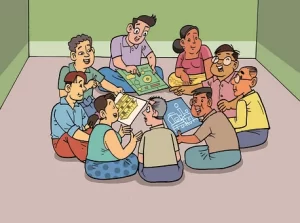What is a social network
 According to Wikipedia, a social network in sociology is a social structure of participants, individuals or organizations, connected by dyadic ties and other social relations (friendship, family ties, ideology, traditions, financial relations, etc.) specific to the participants in the given network. Today, by social network we understand a space on the Internet where we connect with relatives, friends, colleagues and can communicate with them in real time.
According to Wikipedia, a social network in sociology is a social structure of participants, individuals or organizations, connected by dyadic ties and other social relations (friendship, family ties, ideology, traditions, financial relations, etc.) specific to the participants in the given network. Today, by social network we understand a space on the Internet where we connect with relatives, friends, colleagues and can communicate with them in real time.
A social network is an online service that can be used through a website or an application. It helps to more easily build social connections or social relationships between people, such as friendships, business, finances, ideas, causes, interests, hobbies, etc. Social networks are ideal platforms for users to share ideas, events, various interests within their individual network contacts. It is also the place to host online games and create online discussions between a brand and its fans. Social networks allow users to share ideas, photos, articles, activities and interests with people in their network.
Why do we need the web?
 Man is a social being, created to live in social groups and communicate continuously with his fellows. Communication is power and strength. All behavior and all feelings are rooted in some kind of communication. Through communication, people express themselves, their opinion and their position. Until recently, people communicated primarily through personal physical contact: over coffee with a friend, at a business conference or symposium. With the birth and introduction of new technologies all over the world, the way people communicate has radically changed. Today, in seconds, we can contact an individual or a group of people, no matter where they are. We no longer have to wait for the evening news to know what is happening in the world, we can share our lives with our loved ones anywhere, anytime, if they are not with us. All this happens on social networks. They were born in 1994, when technological advances allowed some websites to offer the ability to add forum comments, instant messages, and friend lists.
Man is a social being, created to live in social groups and communicate continuously with his fellows. Communication is power and strength. All behavior and all feelings are rooted in some kind of communication. Through communication, people express themselves, their opinion and their position. Until recently, people communicated primarily through personal physical contact: over coffee with a friend, at a business conference or symposium. With the birth and introduction of new technologies all over the world, the way people communicate has radically changed. Today, in seconds, we can contact an individual or a group of people, no matter where they are. We no longer have to wait for the evening news to know what is happening in the world, we can share our lives with our loved ones anywhere, anytime, if they are not with us. All this happens on social networks. They were born in 1994, when technological advances allowed some websites to offer the ability to add forum comments, instant messages, and friend lists.
Types of social networks
Basically, we can classify social networks into several groups:
- social networks – connecting with people and brands;
- photo sharing networks - share photos, videos, etc.;
- discussion forums - sharing news and ideas;
- tagging and content networks for content - sharing new content;
- user opinion networks;
- blogging and publishing networks - publishing content online;
- interest-based networks – sharing interests and hobbies;
- social networks for shopping.
Pluses and minuses
![]() Social networks are constantly evolving. New features and capabilities are created or added to existing ones. Thanks to them, people always have contact and connection with each other. Networks make it possible to get the quick information we need within a few minutes. The benefits of social networks are many. Unlike in the recent past, when in order to contact our loved ones abroad, we waited a month for a paper letter to arrive or paid a fortune for phone calls, today all we need is electricity and a good internet connection.
Social networks are constantly evolving. New features and capabilities are created or added to existing ones. Thanks to them, people always have contact and connection with each other. Networks make it possible to get the quick information we need within a few minutes. The benefits of social networks are many. Unlike in the recent past, when in order to contact our loved ones abroad, we waited a month for a paper letter to arrive or paid a fortune for phone calls, today all we need is electricity and a good internet connection. ![]() Through social networks today it is much easier to find old friends with whom we have lost touch over time, we easily find like-minded people who share our views and ideas and contact them easily, regardless of time and space. Through the network we inform ourselves and expand our horizons, we have much greater access to any information.
Through social networks today it is much easier to find old friends with whom we have lost touch over time, we easily find like-minded people who share our views and ideas and contact them easily, regardless of time and space. Through the network we inform ourselves and expand our horizons, we have much greater access to any information.
Despite these positive qualities, social networks also have their negatives. Users nowadays are so used to and depend on them that there always comes a moment when a person is doing something - cooking or filling in invoice data for example and periodically stops his activities to check if there is anything new on Facebook, not to miss the latest news on Instagram. These networks very often give wrong, inaccurate, unreliable or exaggerated information. And we users, looking for this information quickly, believe the first one we read.
![]() Another harmful quality that the mass consumer develops is that they lose the ability to communicate in real and physical terms with people. People increasingly fall into a state of depression and anxiety and waste time, energy or money. If a person often looks at content with a negative tone, he begins to feel irritated or nervous. Frequent stay on social networks sometimes leads to a security threat. These are fraud or deception damages that can occur when a malicious attempt to acquire sensitive information such as a username, password and credit card details, by impersonating someone else in electronic communications, or social engineering fraud. Cyberbullying is when third parties abuse us or harass us by sending us rude or threatening messages, insulting, lying or spreading false information about us or our loved ones.
Another harmful quality that the mass consumer develops is that they lose the ability to communicate in real and physical terms with people. People increasingly fall into a state of depression and anxiety and waste time, energy or money. If a person often looks at content with a negative tone, he begins to feel irritated or nervous. Frequent stay on social networks sometimes leads to a security threat. These are fraud or deception damages that can occur when a malicious attempt to acquire sensitive information such as a username, password and credit card details, by impersonating someone else in electronic communications, or social engineering fraud. Cyberbullying is when third parties abuse us or harass us by sending us rude or threatening messages, insulting, lying or spreading false information about us or our loved ones.
To escape the stress and addiction of the web
First of all, you need to know the different setup options of the respective network. So you will very easily and quickly decide who and what we want you to read. Blocking or ignoring friends and pages that constantly bombard you with negative news is a good solution, but not enough. At the same time, you can search for accounts, pages and groups that bring you positive emotions and match your interests.
Another method to avoid stress is to reduce the time spent on the net. However, this requires a certain amount of self-control - something difficult for already addicted people. Set an alarm on your phone to remind you in an hour, for example, to put your device down and get moving. In the evening while you sleep, it is desirable that the sound is turned off and your device is far from you. That way you won't be tempted to peep into the chat when the phone vibrates.
 When you are in company or even with just one person, force yourself to put the phone in your bag/pocket. And in your free time, try to reduce the time spent in front of the screen every day, be it on a computer or phone. To do this, find a hobby. You can listen to music, take a walk, read... or bake a cake. just do something you enjoy while keeping your phone and computer in the other room.
When you are in company or even with just one person, force yourself to put the phone in your bag/pocket. And in your free time, try to reduce the time spent in front of the screen every day, be it on a computer or phone. To do this, find a hobby. You can listen to music, take a walk, read... or bake a cake. just do something you enjoy while keeping your phone and computer in the other room.
And if you are the parent of an addicted child, by no means impose a complete ban. Because it will only exacerbate the hunger for virtual social contact. Put limits on the child, but let him use the networks. We live in the 21st century after all.
The benefits and harms of social networks are a dilemma that can only be resolved by the user himself.
© 2023 Iliana Dechkova

